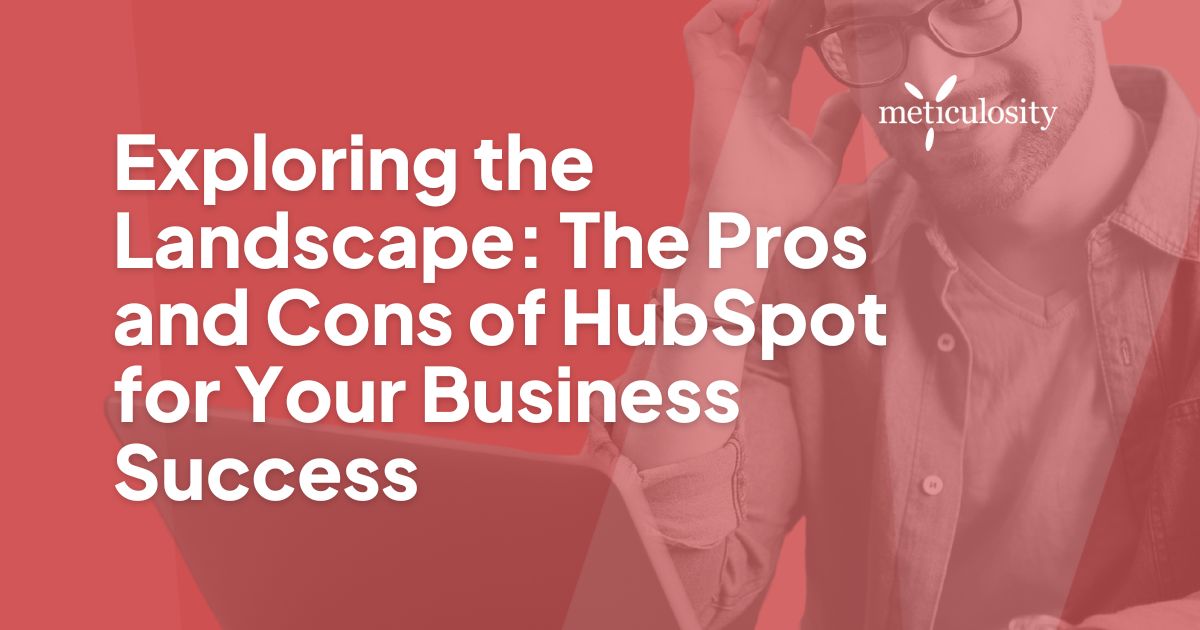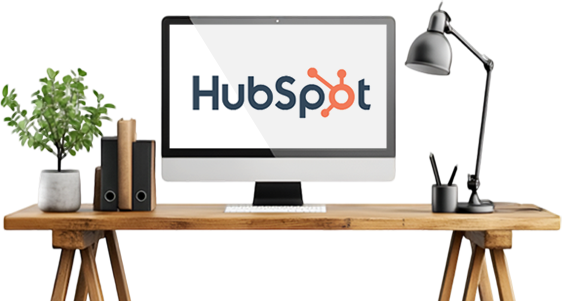Are you searching for a smooth, comprehensive solution to elevate your business marketing game?
Consider this blog post your guide: it will unravel the benefits and any potential speed bumps you might encounter with using Hubspot, starting from its features to alternatives that may fit better according to varying needs.
Key Takeaways
- HubSpot offers a comprehensive suite of marketing tools, including blogs, emails, social media, and ads on search engines like Google.
- It provides automation capabilities to save time and keep in touch with clients even when you're busy.
- HubSpot's analytics and reporting features help track the performance of your campaigns and make data-driven decisions.
- The platform seamlessly integrates with other tools for better synchronization of data and more personalized marketing campaigns.
- Small businesses can benefit from the free CRM option offered by HubSpot.
- However, advanced features of HubSpot can be expensive, there is a learning curve involved, customization options are limited, and it may not be suitable for large enterprises.
- Alternatives worth considering include Salesforce, Marketo Pardot Zoho CRM, or Mailchimp.
Overview of HubSpot
Ready to take a deep dive into the world of HubSpot? This powerhouse software platform is a game changer for businesses aiming high - helping you attract new visitors, convert curious browsers into leads, and seal the deal with customers effortlessly.
If you've been searching far and wide for an integrated system to supercharge your marketing campaigns or streamline your sales process, then buckle up because HubSpot might just be the answer to your prayers.
But that's not all, folks! HubSpot boasts tools galore designed to crank up your customer engagement strategies along with some pretty sophisticated CRM capabilities. Their full suite of products includes Marketing Hub, Sales Hub, and Service Hub – plus a robust CRM at its heart – all humming together harmoniously on one powerful platform.
Imagine having every tool you could ever need to steer your business processes in one place—from email marketing prowess through social media wizardry right down to nitty-gritty analytics reporting.
Before we get too carried away, though, let’s make sure we're approaching this sensibly by weighing up both the pros and cons thoroughly. That way, when it comes time to decide whether or not jumping aboard the good ship HubSpot is right for you – rest assured it'll be an informed decision backed by clear-sighted assessment.
Pros of Using HubSpot
HubSpot offers a comprehensive suite of marketing tools, helping businesses streamline their efforts and drive results.
A comprehensive suite of marketing tools
HubSpot has a full set of tools to help with marketing. You can use it for blogs, emails, and social media. With these tools, you can make and share your ads quickly. It even helps you put your ads on search engines like Google.
You also get help spotting leads. This means HubSpot can show you who might want your stuff. It helps tell other people about what you sell, too, in ways that catch their eye. Plus, it lets you test different things to see what works best for selling your goods or services.
Automation capabilities
HubSpot makes your work easy with its automation tools. You can set up tasks like emails, social media posts, and more to go out on their own. This helps save time and keeps things moving without you having to do it all.
Plus, it lets you keep in touch with clients even when busy doing other things!
Analytics and Reporting
Analytics and reporting are crucial aspects of using HubSpot for your business. With its comprehensive suite of marketing tools, you can easily track and measure the performance of your campaigns and strategies.
HubSpot provides detailed insights into metrics like website traffic, lead generation, customer engagement, and more. You can also create custom reports to analyze data that aligns with your business goals.
By leveraging the analytics and reporting capabilities of HubSpot, you can make data-driven decisions to optimize your marketing efforts and drive better results.
Integration with other tools
HubSpot offers seamless integration with various other tools, making it easier to streamline your marketing efforts. With HubSpot's integration capabilities, you can connect your CRM system, email marketing platform, social media accounts, and more.
This allows for better data synchronization across platforms and enables you to create more personalized and targeted marketing campaigns. By integrating with other tools, you can also automate certain tasks and improve overall efficiency in managing your marketing activities.
Additionally, the analytics provided by HubSpot help track the effectiveness of these integrations, allowing you to make data-driven decisions for your business. So whether it's syncing contact information or automating workflows, HubSpot's integration features offer valuable benefits for marketers looking to optimize their strategies.
Free CRM option
HubSpot offers a free CRM option, which can be a great advantage for businesses that are just starting or have a limited budget. With this free option, you can manage your customer relationships effectively without paying for an expensive CRM tool.
The HubSpot CRM allows you to store contacts, track deals, and sales activities, and create personalized email templates. It's easy to use and provides valuable insights into your customers' engagement with your business.
This feature alone makes HubSpot an attractive choice for small businesses looking to streamline their sales processes without breaking the bank.
Looking to optimize HubSpot for your business? Learn how to improve here.
Cons of Using HubSpot
Using HubSpot may have drawbacks, including its high cost for advanced features, steep learning curve, limited customization options, and not being ideal for large enterprises.
High cost for advanced features
The advanced features of HubSpot can be quite expensive. While the basic tools may be affordable, unlocking additional functionalities can significantly increase costs. This may not be ideal for businesses operating on a tight budget.
It's important to carefully consider whether the benefits of these advanced features outweigh the financial investment required. Keep in mind that there are other alternatives available in the market that offer similar capabilities at different price points, so it's worth exploring those options as well.
Steep learning curve
The learning curve for using HubSpot can be quite steep initially, especially for those new to marketing automation software. However, with the right training and resources, marketers and business professionals can quickly get up to speed.
It may take some time to understand all the features and functionality that HubSpot offers fully, but once you do, it can greatly benefit your business. Don't let the initial learning curve deter you from considering HubSpot as a valuable tool for your marketing efforts.
With dedication and practice, you'll be able to navigate the platform smoothly and reap its rewards for increased efficiency, lead generation, and customer engagement.
Limited customization options
When it comes to HubSpot, one downside is the limited customization options. While it offers a comprehensive suite of marketing tools, you may find that your ability to customize those tools is somewhat restricted.
This can be a concern if your business has specific branding or design requirements. Additionally, if you want more control over how your campaigns and workflows are set up, HubSpot's customization options might feel limiting.
However, despite this limitation, HubSpot still provides a user-friendly platform with many valuable features that can benefit your business.
Not ideal for large enterprises
Large enterprises may find that HubSpot is not the best fit for their needs. While HubSpot offers a comprehensive suite of marketing tools and automation capabilities, it may struggle to handle the scale and complexity required by larger organizations.
Additionally, customization options are limited, which can be restrictive for businesses with unique requirements. Large enterprises often have more resources at their disposal, and the high cost of advanced features might not align with their budgetary considerations.
It's important for these organizations to carefully evaluate whether HubSpot can meet their specific needs before making a decision.
Dependence on the HubSpot ecosystem
As a marketer or business professional considering HubSpot for your business success, it's important to be aware of the dependence on the HubSpot ecosystem. When you rely on HubSpot, you become closely tied to their platform and tools.
While this can have advantages, such as seamless integration between different marketing functions, it also means that you're limited to what HubSpot offers. So if some specific features or functionalities aren't available within the ecosystem, you'll need to look for external solutions or workarounds.
This level of reliance might not be suitable for every business, especially larger enterprises with complex needs and existing systems in place. Therefore, before committing fully to HubSpot, carefully evaluate how dependent your organization is willing and able to be on its ecosystem.
Alternatives to Consider
When considering alternatives to HubSpot, you may want to explore Salesforce, Marketo, Pardot, Zoho CRM, and Mailchimp as viable options for your business.
Salesforce
Salesforce is a popular alternative to HubSpot for businesses looking to manage their customer relationships. It offers a comprehensive suite of tools and features that can help you streamline your sales and marketing processes.
With Salesforce, you can track leads, manage contacts, and automate tasks to save time and increase efficiency. The platform also provides powerful analytics and reporting capabilities, allowing you to gain insights into your business performance.
Integration with other tools is seamless, making connecting Salesforce with your existing systems easy. While Salesforce may be more suitable for larger enterprises due to its robust features and scalability options, it can still benefit businesses looking for a reliable CRM solution.
Marketo
Marketo is another popular marketing automation tool that businesses can consider as an alternative to HubSpot. It offers a comprehensive suite of marketing tools, including email marketing, lead management, and analytics.
Marketo also provides advanced features for segmentation and personalization, allowing businesses to create targeted campaigns. However, one downside of Marketo is its pricing structure, which can be quite expensive for smaller businesses.
Additionally, the platform has a steep learning curve and may require technical expertise to utilize its capabilities fully. Despite these challenges, users have widely praised Marketo for its robust functionality and ability to drive results in lead generation and customer engagement.
Pardot
Pardot is another option worth considering for your business. It offers a comprehensive suite of marketing tools, including automation capabilities and analytics and reporting features.
Pardot also integrates well with other tools, making it easy to streamline your marketing efforts. However, like HubSpot, there are some drawbacks to using Pardot. The cost can be high for advanced features, and there may be a steep learning curve for new users.
Additionally, customization options may be limited, and Pardot may not be the best choice for large enterprises. Despite these limitations, Pardot can still be a valuable tool in your marketing arsenal if it aligns with your business goals and needs.
Zoho CRM
Zoho CRM is another alternative to consider when evaluating your options for business success. It offers a range of features for marketing and sales, such as lead generation and customer engagement.
Zoho CRM also provides analytics and reporting capabilities to help you track the effectiveness of your campaigns and measure ROI. One advantage of Zoho CRM is its user-friendly interface, making it easy for businesses to navigate and utilize its various functions.
Additionally, Zoho CRM offers integrations with other tools, allowing for seamless collaboration and efficiency across different platforms.
Mailchimp
It's a popular email marketing platform that offers a range of features to help businesses connect with their audience. With Mailchimp, you can easily create and send professional-looking emails, manage your subscriber lists, and track the performance of your campaigns through detailed analytics.
They also provide automation tools that allow you to schedule and personalize your emails based on customer behavior or triggers. Another great thing about Mailchimp is its user-friendly interface, which makes it easy for even non-technical users to navigate and utilize effectively.

Factors to Consider Before Using HubSpot
Before deciding to use HubSpot, it is important to consider factors such as budget and resource availability, alignment with business goals and needs, and technical capabilities.
Budget and resource availability
Before deciding to use HubSpot for your business, one important factor to consider is your budget and the availability of resources. HubSpot offers a range of pricing options, from a free CRM to more advanced features at a higher cost.
You'll need to assess whether these costs align with your budget and if you have the financial resources to invest in this platform. Additionally, implementing and utilizing HubSpot effectively may require dedicated resources such as staff who can learn and manage the platform, as well as time for training and ongoing maintenance.
So, consider your financial capabilities and available resources before using HubSpot for your business success.
Alignment with business goals and needs
To fully maximize the benefits of using HubSpot, aligning it with your business goals and needs is crucial. Before diving into this software, take some time to evaluate whether HubSpot's features and capabilities are aligned with what you want to achieve.
Consider lead generation, customer engagement, multichannel campaigns, and ROI. Take into account your budget and resource availability, as well as your technical capabilities.
By ensuring that HubSpot matches your specific requirements, you can make the most out of this platform for the success of your business.
Technical capabilities
HubSpot offers a range of technical capabilities that can benefit your business. With its comprehensive suite of marketing tools, you can easily manage and automate your marketing campaigns.
The platform provides analytics and reporting features, giving you valuable insights into the performance of your marketing efforts. HubSpot also integrates with other tools, making it easier to streamline your processes.
Plus, there's a free CRM option available, which is great for businesses on a budget. Overall, HubSpot's technical capabilities are designed to help you optimize your marketing strategies and drive success for your business.
In addition to HubSpot, there are other alternatives to consider, like Salesforce, Marketo, Pardot, Zoho CRM, and Mailchimp, depending on the specific needs of your business. Evaluating factors such as budget and resource availability and aligning with business goals and needs is important before deciding on a platform.
Each tool has its own features, pricing plans, and user ratings, so take the time to compare them before making a decision.
How Does HubSpot Compare to Competitors?
Discover how HubSpot stacks up against its competitors regarding features, pricing, and user ratings to help you make an informed decision for your business. Read more to find out which platform may be the best fit for you.
Features
HubSpot offers a comprehensive suite of marketing tools that can benefit businesses. It includes automation capabilities, analytics, reporting features, and the ability to integrate with other tools.
The platform also offers a free CRM option, which is great for businesses on a tight budget. However, there are some drawbacks to consider as well. HubSpot's advanced features can be expensive, and there is a steep learning curve involved.
Additionally, customization options are limited, and the platform may not be ideal for large enterprises. It's important to carefully evaluate these features before deciding if HubSpot is right for your business needs.
Pricing
The pricing for HubSpot can vary depending on your business needs. They offer different tiers of plans, ranging from free to enterprise-level options. The free plan includes basic features like CRM and email marketing, while the higher-tier plans have more advanced tools and capabilities.
It's important to consider your budget and resources when deciding which plan is right for you. Remember that some of the more advanced features can be quite expensive, so it's essential to weigh the cost against the potential benefits for your business.
Additionally, HubSpot offers training and support resources to help you make the most of their platform and maximize its value for your organization.
User ratings and reviews
As a marketer or business professional, knowing what others think about a tool is always helpful before deciding if it's right for you. When it comes to HubSpot, user ratings and reviews are generally positive.
Many users appreciate the comprehensive suite of marketing tools that HubSpot offers. They find the automation capabilities and analytics and reporting features particularly useful for their businesses.
Integration with other tools is also seen as a strong advantage.
On the downside, some users have mentioned that advanced features in HubSpot can be quite expensive. There may also be a learning curve involved in mastering all the functionalities, which can be challenging for some individuals or teams.
Additionally, customization options may be limited compared to other platforms, and large enterprises might find that HubSpot doesn't fully meet their specific needs. It's important to consider these aspects when evaluating if HubSpot is the right fit for your business goals and requirements.
Tips for Maximizing the Benefits of HubSpot
To maximize the benefits of HubSpot, take advantage of the training and resources available to learn how to use all the features and tools offered effectively.
Utilize training and resources
To make the most of HubSpot, it's important to utilize the training and resources available. HubSpot offers various training programs and certifications that can help you understand how to use their tools effectively.
Take advantage of these resources to learn best practices and gain in-depth knowledge about different aspects of marketing, automation, analytics, and more. Additionally, explore the HubSpot community forums where you can connect with other users, ask questions, share insights, and learn from their experiences.
By utilizing these training opportunities and resources provided by HubSpot, you can enhance your skills and maximize the benefits of using this platform for your business success.
Regularly evaluate and adjust your strategies
To maximize the benefits of using HubSpot for your business, it's important to regularly evaluate and adjust your strategies. Keep track of your marketing efforts and assess their effectiveness in reaching your goals.
Look at data and analytics provided by HubSpot to understand what's working and what needs improvement. By evaluating your strategies, you can identify areas that need adjustments or changes.
Once you've identified areas that require improvement, make the necessary adjustments to optimize your marketing campaigns. This may involve tweaking your messaging, targeting different audiences, or experimenting with different channels.
Regularly testing and adjusting allows you to fine-tune your approach based on real-time feedback.
Remember, marketing is a dynamic field, so staying open to change is crucial. Continuously monitoring and modifying your strategies will help ensure that you are getting the most out of HubSpot's capabilities while adapting to evolving market trends.
Take advantage of integrations
Integrations are a key feature of HubSpot that can greatly benefit your business. By integrating with other tools and platforms, such as social media, CRM systems, and email marketing software, you can streamline your processes and improve efficiency.
For example, by integrating HubSpot with your CRM system, you can easily track and manage leads across both platforms. This allows for better coordination between sales and marketing teams, ensuring that no opportunities are missed.
Integrations also enable you to leverage the data from different sources to gain valuable insights into your customers' behavior and preferences. So don't forget to take advantage of the integrations available with HubSpot to enhance your overall marketing strategy!

Conclusion
In conclusion, HubSpot offers a comprehensive suite of marketing tools with automation capabilities and advanced analytics. However, it may not be ideal for large enterprises due to its high cost and limited customization options.
Consider your budget, business goals, and technical capabilities before deciding if HubSpot is the right choice for your business success. Remember to explore alternatives like Salesforce or Marketo as well.
Click here to learn more about HubSpot marketing.
FAQs
1. What are the key advantages of using HubSpot for my business?
- Pros of HubSpot:
- All-in-One Platform: HubSpot integrates marketing, sales, and customer service tools into a unified platform, providing a centralized solution for customer interactions.
- Ease of Use: HubSpot offers a user-friendly interface, making it accessible for users with varying levels of technical expertise.
- Marketing Automation: Robust marketing automation features facilitate lead nurturing, personalized content delivery, and streamlined campaign management.
- Comprehensive Analytics: Access detailed analytics and reporting tools to measure the performance of marketing efforts, sales activities, and customer interactions.
2. How does HubSpot support inbound marketing strategies?
- Pros of HubSpot for Inbound Marketing:
- Content Creation: Create, optimize, and manage content directly within HubSpot to attract, engage, and delight your target audience.
- Lead Generation: Utilize tools for capturing leads through forms, landing pages, and calls-to-action (CTAs), fostering a continuous flow of potential customers.
- Personalization: Leverage data and insights to personalize marketing messages, creating a tailored experience for your audience.
- Lead Scoring: Implement a lead scoring system to prioritize and focus on the most qualified leads for sales efforts.
3. What are the potential challenges or drawbacks of using HubSpot?
- Cons of HubSpot:
- Cost: HubSpot's pricing may be a consideration for small businesses or startups, as it can be relatively higher than some competitors.
- Learning Curve: While user-friendly, the platform may have a learning curve, especially for users new to inbound marketing or automation tools.
- Customization Limitations: Advanced customization may be limited compared to more complex enterprise solutions, which might be a consideration for businesses with highly specific needs.
- Continuous Updates: Frequent updates to the platform can require users to stay informed about new features and changes.
4. Can HubSpot be integrated with other tools, and are there any limitations?
- Pros and Cons of Integrations:
- Pros: HubSpot offers a wide range of integrations with third-party tools, enhancing its functionality and adaptability to different business needs.
- Cons: Some integrations may have limitations, and not all tools may be seamlessly integrated. Users should check compatibility and functionality with specific third-party applications.
In conclusion, while HubSpot provides a robust suite of tools for inbound marketing and customer relationship management, businesses should carefully evaluate their specific requirements and weigh the pros and cons to determine if HubSpot is the right fit for their goals.







